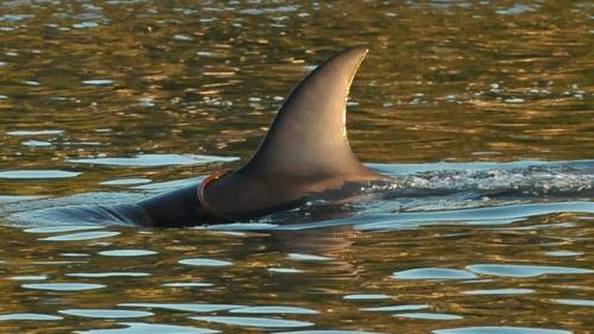|
Trapped juvenile transient orca known as Sam (T046C2) rescued successfully by the Vancouver Aquarium and Department of Fisheries and Oceans. http://www.newswire.ca/en/story/1211571/trapped-juvenile-transient-killer-whale-rescued-by-vancouver-aquarium-and-dfo Here is transient orca T046C2, known as Sam. Josh McInnes of theTransient killer whale Research blog by Josh McInnes (c) explains more about Sam's entrapment and rescue (19/08/2013): The last few weeks a transient killer whale designated T046C2 (Aka Sam) was sighted trapped in a small shallow bay on the central coast, Weeteeam Bay on Aristazabal Island. T046C2 was born in 2009 belonging to a group of transients not frequently seen. Researchers from the Vancouver aquarium on board the research vessel "Skana" were on scene. His plaintive cries echoed across the bay. This bay being shallow and narrow usually would not be an issue for transient killer whales, as they usually frequent small bays and inlets in search of their main prey harbour seals that bask on haul outs. Killer whales are very social animals with strong cultural bonds that take time to progress from learned behavior to innate behavior. He was most likely separated during a foraging session, and without the knowledge of the pod on how to maneuver these tricky areas was stranded. He was reported to have been chasing salmon and sea birds with occasional capture of a bird. Transient calves usually are trained to chase and capture marine birds and seals before they move onto larger animals like sea lions or porpoise which are very difficult and can pose a threat to a younger whale.Marine birds are probably the most important animal a young calf could use in training. Over time T046C2 began to show signs of malnutrition with a pronounced dip behind the blowhole which is given the term "peanut." Researchers first attempted to play sounds from his own pod at the entrance of the bay hoping he will reunite with his pod, but the little whale was still reluctant on crossing the entrance of the bay. They than used a line to drag behind him towards the entrance while playing the sounds from his pod. He shot off and through the mouth of the bay, where rumor has it he has joined a new pod. the last news was that T046C2 has joined up with two other transient killer whales which is very important for foraging. There also is a risk of encountering a resident killer whale pod if on his own which maybe dangerous to the young whale. It is very common for females to join other groups for a better success in foraging. With the transient pod structure being very fluid there is a good chance he will be welcomed into a new group. I am currently in contact with the Vancouver Aquarium Cetacean Research Program and I will update you all on the progress of the Sam and on his companions.
0 Comments
Leave a Reply. |
Archives
January 2017
|


 RSS Feed
RSS Feed
